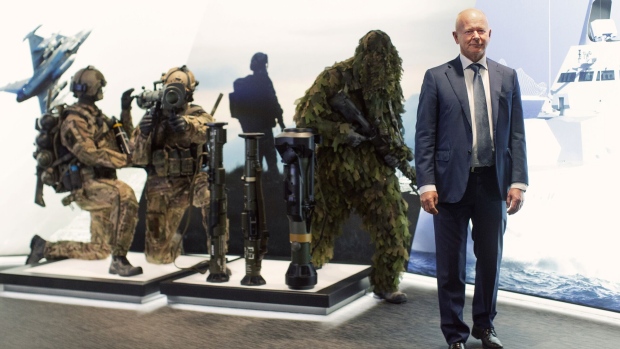May 31, 2023
Sweden’s Saab Comes In From Cold as Investors Return to Defense
, Bloomberg News

(Bloomberg) -- At the start of 2022, Saab AB was struggling to attract investors. Its automotive unit long gone, the Swedish maker of Gripen fighter jets found itself shunned by fund managers wary of backing companies that profit from selling weapons.
Then Vladimir Putin invaded Ukraine, and everything changed. Defense spending is on the rise, orders have started to pour in, and investors have embarked on a rethink of the ethical criteria that kept them away. Saab, which had trouble drawing more than a handful of people to its investor meetings, saw its stock jump 40% within days of the assault.
“We had investors telling us, ‘We will never invest in Saab. You’re manufacturing dangerous products,’” Chief Executive Officer Micael Johansson said in an interview. “Just weeks later the same investors thought that maybe it wasn’t such a bad idea.”
Since then, the stock-market value of the Linköping-based company has almost tripled to 81.8 billion kronor ($7.54 billion), and order backlog reached a record 133 billion kronor at the end of the first quarter. Johansson set a new target for organic sales growth of around 10% annually through 2027.
Nato Expansion
Russia’s war in Ukraine has galvanized European lawmakers, who plan to budget $3.5 trillion on defense from 2023-2030. With Finland joining Nato and Sweden seeking to follow suit, military spending is projected to increase in Saab’s home market, which made up 42% of 2022 sales.
Other defense companies have also benefited. Germany’s Rheinmetall, UK-based BAE Systems Plc and France’s Thales SA are among the European firms supplying Ukraine with armaments from tanks and ammunition to air-defense systems. Each has seen a dramatic increase in its stock price.
Saab is best known for the Gripen, but that segment only accounted for about a fifth of last year’s operating profit. It also makes submarines, early warning aircraft and support weapons such as the Carl-Gustaf recoilless rifle, which is used by Ukrainian forces.
Prior to Putin’s invasion, the debate around ethical and sustainable investing had left Saab management highly frustrated. Johansson said it was inconceivable to him that politicians could support defense spending while making it harder for manufacturers to attract capital.
“It’s completely different today, and I think that’s healthy,” the CEO said. “I’m not saying that it won’t come back on the agenda, but the taxonomy issue has just vanished in Brussels.”
Investors Return
One shareholder to reconsider its investment is Swedbank Robur, Sweden’s largest fund manager. It was the fourth-largest owner of Saab in 2019, but by spring 2021 had sold its last share.
Following the invasion, Swedbank Robur started building a new position. It is now Saab’s third-largest investor with a 5.2% stake.
While some investors are back, the overall campaign to brand weapons as sustainable has made little headway, according to a Barclays study published in May. Funds that claim to target environmental, social and good governance goals are expanding their exclusionary policies around weapons and other controversial products, it found.
Investors should have realized earlier that Saab is crucial from a sustainability perspective, Johansson said. He expects Europe’s military buildup to go on for at least a decade.
“All the ESG issues are highly important, but it’s difficult to talk about the other ones if we can’t protect our populations and societies,” the CEO said.
©2023 Bloomberg L.P.


